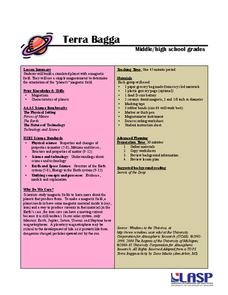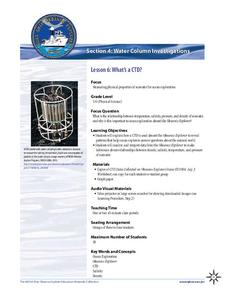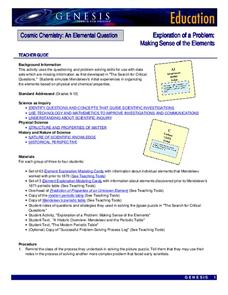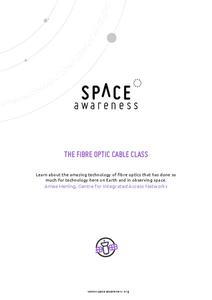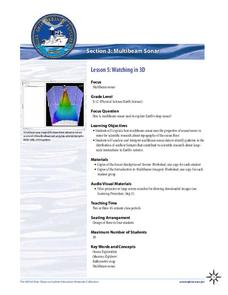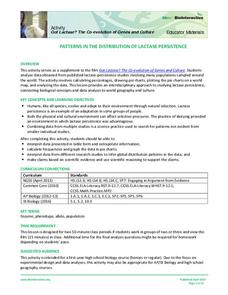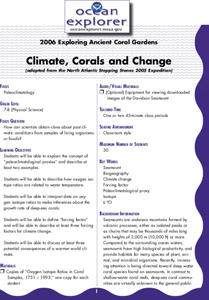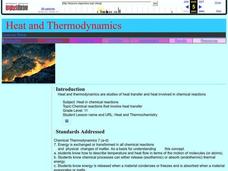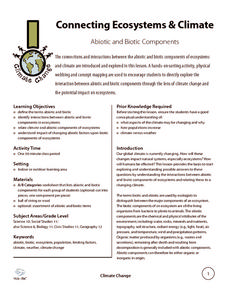PBS
Breaking it Down
After challenging themselves to correctly choose the form of erosion and length of time required for a given landform to develop, earth science class members model mechanical and chemical weathering with various lab demonstrations over...
Lerner Publishing
Living or Nonliving
It's alive! Or is it? Through a series of shared readings, whole class activities, and independent exercises children explore the difference between living and non-living things, creating a pair of printable books to demonstrate their...
EduGAINs
Form and Function
Will that structure survive the force? The differentiated lesson allows pairs to choose the structure they would like to construct and the building materials they wish to use. Individuals record their findings in the observation chart...
Earth Day Network
Filtering Water
See the water filtration system up close with a fun science experiment. Young scientists work for several class periods to design a water filter using household objects, and then decide which filter material would be most effective in...
University of Colorado
Terra Bagga
One way to identify possible volcanic activity on other planets is by testing the planet for magnetism. A science lesson begins with pupils constructing their own planet from a dead battery, magnets, paper, and tape before labeling the...
NOAA
What's a CTD?
Why are the properties of the water important when exploring the ocean? Young scientists discover the tools and technology used in deep sea exploration in the fourth installment in a five-part series. Groups work together to examine...
NOAA
The Oceanographic Yo-yo
How does chemistry help deep-sea explorers? Part four of a five-part series of lessons from aboard the Okeanos Explorer introduces middle school scientists to technologies used in ocean exploration. Groups work together to analyze data...
NASA
Exploration of a Problem: Making Sense of the Elements
When given too much data to simply memorize, it helps to sort it into manageable groups. The second instructional activity in the six-part series of Cosmic Chemistry challenges groups of pupils to take a large amount of data and figure...
Conserve Wildlife Foundation of New Jersey
The Great Peregrine Scavenger Hunt - On the Internet
The story of one bird provides valuable insight into general animal behaviors and interactions. Young researchers investigate the peregrine falcon using a web search. They analyze the behaviors of the raptor including its migration...
Virginia Department of Education
Planet Line-Ups
Should Pluto be considered a planet or a dwarf planet? Scholars research planets in our solar system to understand their similarities and differences. It also includes memory activities related to the order of the planets.
Teach Engineering
A Simple Solution for the Circus
Class members are challenged to design a device that will move a circus elephant into a train car. Groups brainstorm ideas that use simple machines to load the elephant. They then choose one of their ideas, sketch a plan, and present it...
Virginia Department of Education
The Cycles of Nature
Encourage peer collaboration and assist with the creation of visual aids to identify carbon, water, and nitrogen cycles as your class learns more about nature. They discuss relative information, create a visual aid depicting the chosen...
Space Awareness
The Big Meltdown
Explore the world (our world) of melting ice caps. Why are these caps melting? What is the effect of melting ice caps? Dive into the ever-present issue of global warming with a resource that has learners looking at data and participating...
Teach Engineering
Magical Motion
Make solutions to projectile motion problems magically appear using equations. Pupils watch a clip from a Harry Potter movie and find the length of time it takes for a remembrall to fall into Harry's hands. They use a projectile motion...
Space Awareness
The Fibre Optic Cable Class
Many people know that fiber optics are used in delivering the Internet, but are surprised to learn they are also used in astronomy. Scholars explore light, reflection, and fiber optics through hands-on activities. They discuss methods of...
NOAA
Watching in 3D
Bring the ocean floor to life! Earth science scholars discover the process of deep sea mapping in the third installment in a series of five lessons about ocean exploration. The teacher's guide includes helpful resources, worksheets, and...
Howard Hughes Medical Institute
Patterns in the Distribution of Lactase Persistence
We all drink milk as babies, so why can't we all drink it as adults? Examine the trend in lactase production on the world-wide scale as science scholars analyze and interpret data. Groups create pie charts from the data, place them on a...
Howard Hughes Medical Institute
Lactose Intolerance: Fact or Fiction
Around the world, about 2/3 of adult humans are lactose intolerant. Scholars work in small groups to discuss a few statements about lactose intolerance. Then, they watch a video on the topic and readdress each statement. Whole-class...
NOAA
Climate, Corals and Change
Global warming isn't just an issue on land; deep ocean waters are also showing troubling signs. Young scientists learn more about deep water corals and the many recent discoveries researchers have made. Then they examine data related to...
NOAA
A Matter of Density
Larvae transportation on the New England seamounts is based on the density of the water. Scholars calculate density and graph salinity versus temperature to better understand the distribution of organisms in a water column. Discussions...
Curated OER
Heat and Thermodynamics
This is actually a 10-day mini unit on thermal energy for your high school chemists. Every avenue is taken to get learners absorbed in heat: a pretest, a PowerPoint presentation, Internet exploration, demonstrations, lab activities, and...
Wild BC
Connecting Ecosystems & Climate
Collaborators sort a set of cards into biotic and abiotic categories. Then, as a class, they discuss their work and relate each of the abiotic components to climate change. Finally, they form a web of components by connecting those that...
Massachusetts Institute of Technology
Lego Atoms and Molecules: Chemical Reactions
Show young chemists what a chemical reaction looks like with two parts of a hands-on experiment. First, learners conduct a wet lab where they observe the reactants (baking soda and calcium chloride, with phenolsulfonphthalein) before,...
University of California
Energy and Biomass Pyramids
Young scientists play tag as they act out the food pyramid in the ocean ecosystem. Energy circles pass from the smaller prey to the predators and at the end of the activity, a data chart and analysis questions allow pupils to apply their...
Other popular searches
- Physics Concepts Momentum
- Physics Concepts on Pressure
- Physics Concepts Motion
- Physics Concepts Force
- Physics Concepts Light
- Physics Concepts 24
- Different Physics Concepts
- Physics Concepts Flight






